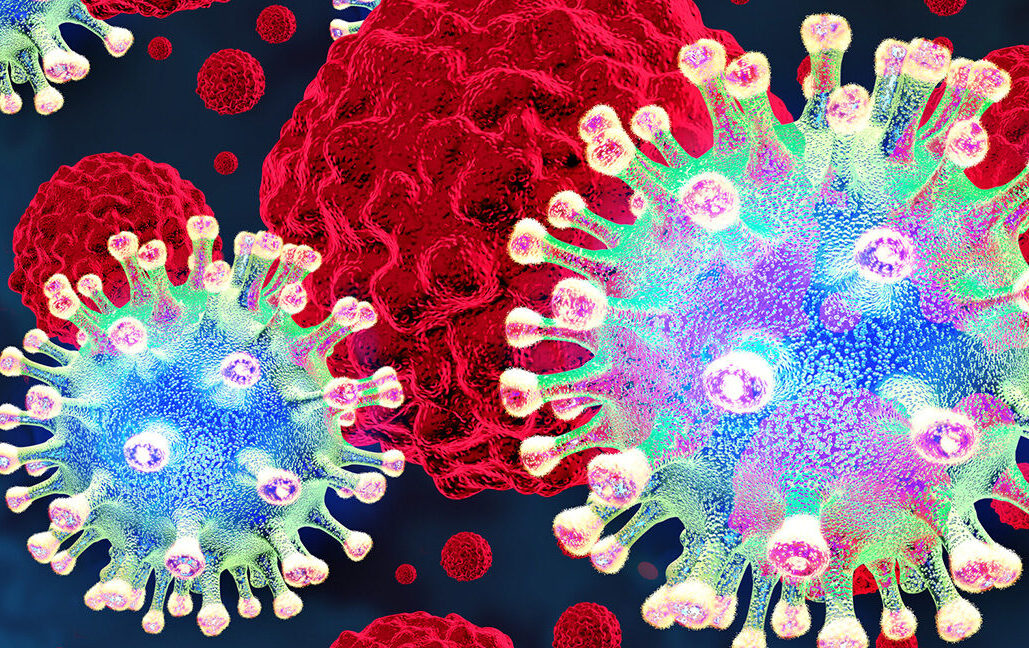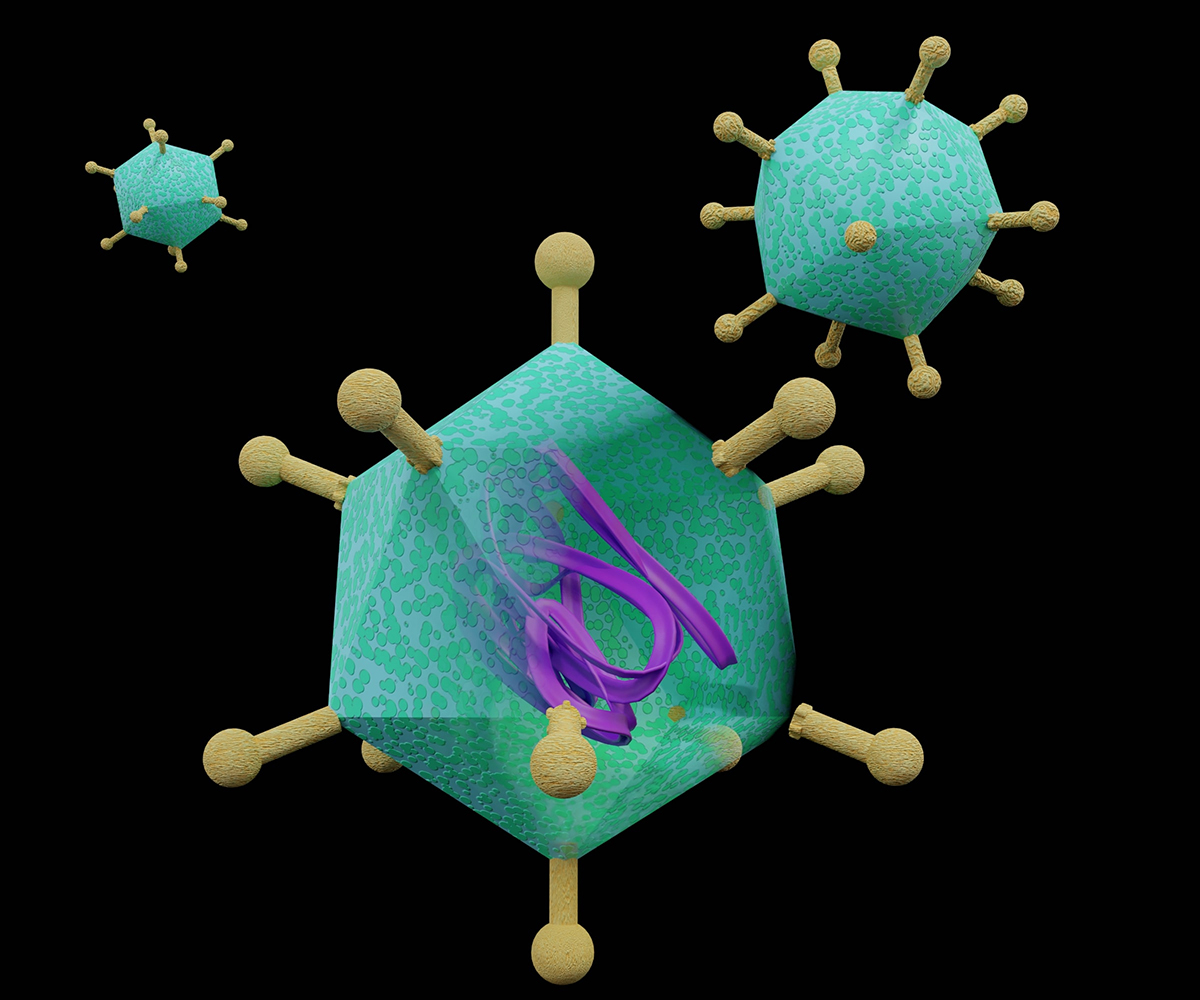
Oncolytic virus therapy is a form of immunotherapy that uses viruses to infect and kill cancer cells. It’s a fascinating type of cancer cell and gene therapy and may lead to a breakthrough in treating solid tumors.
People often have questions about how oncolytic virus therapy works, such as:
- What exactly is oncolytic virus therapy?
- Are the viruses dangerous to the patient?
- How do these viruses kill cancer cells?
- Which viruses are used for oncolytic virus therapy?
- What types of cancer can be treated with oncolytic virus therapy?
In this blog article, Alliance for Cancer Gene Therapy hopes to provide readers with an in-depth explanation of oncolytic virus therapy for cancer.
After reading, please sign up for our monthly email newsletter. This free resource provides you with the latest news about the field of cancer cell and gene therapy.
What is oncolytic virus therapy?

Oncolytic virus therapy – also called virotherapy – is a form of immunotherapy that uses viruses to infect cancer cells. Immunotherapy is the general term for cancer treatment that aids the immune system. Cell and gene therapy is a type of immunotherapy.
What are viruses, though?
The Cancer Research Institute, which is a partner of Alliance for Cancer Gene Therapy, provides a definition:
“Viruses are particles that infect or enter our cells and then use the cell’s genetic machinery to make copies of themselves and subsequently spread to surrounding uninfected cells.”
Is there a risk for the patient to have a virus injected into their body?
Are oncolytic viruses dangerous?
Oncolytic virus therapy is a modified version of once-harmful viruses, which may seem like a risk.
The viruses are engineered to kill cancer cells exclusively. They are programmed not to attack healthy tissue. Scientists modify them to target specific cells with specific genetics that are linked to the patient’s cancer.
How do oncolytic viruses kill cancer cells?
Oncolytic viruses first infect cancer cells, which are already susceptible to viruses. The Cancer Research Institute states, “Cancer cells often have impaired antiviral defenses that make them susceptible to infection.”
Once the virus infects the cancer cell, it begins to break the cell apart. The breaking-apart aspect is especially important, as this is what activates the immune system. When the cancer cells break apart, they release previously hidden antigens (proteins) that are unique to the cancer. These antigens are fingerprint evidence of cancer’s existence, and the immune system can use this evidence to find other cells with the same antigens.
Oncolytic viruses with other cell and gene therapies
Oncolytic viruses can also be viral vectors, which transport other cancer therapies into tumor cells. For instance, oncolytic viruses can be used to deliver gene therapy into cancer cells. Once the virus reaches the destination, it shuts off.
Oncolytic viruses can pair with other types of cell and gene therapy, too. For instance, engineered T cells can be viral vectors for oncolytic viruses. Researchers at Arizona State University are developing a T-cell therapy where the cells carry the myxoma virus.
“During myxoma-mediated (cell death), cancerous cells in the vicinity of those targeted by the therapy are also destroyed in a process known as bystander killing,” researchers stated. “This effect can considerably enhance the dual therapy’s aggressive eradication of cancer cells, even in notoriously hard-to-treat solid tumors.”
Which viruses are used for cancer virotherapy?
There are a number of viruses being considered for potential oncolytic virus therapy. The most common is the herpes simplex virus. For example, this virus is currently being used in an oncolytic virus therapy clinical trial for glioblastoma.
Other viruses used for cancer virotherapy include:
- Adenovirus (a group of viruses that cause sore throat, common cold and other mild infections)
- Measles
- Vaccinia virus (used to vaccinate against smallpox)
What types of cancer can oncolytic viruses treat?
Oncolytic virus therapy has potential for most, if not all, solid tumors. There is one oncolytic virus therapy approved by the U.S. Food and Drug Administration for cancer: T-VEC, a modified herpes simplex virus, for specific types of melanoma cases. T-VEC is also the first cell and gene therapy approved for cancer.
Brain cancer is another type of tumor receiving focus for oncolytic virus research and development. John Bell, PhD, of Ottawa Hospital Research Institute, is an ACGT Research Fellow who received a multi-year grant from the foundation to develop oncolytic virus therapy for the brain cancer glioblastoma. Juan Fueyo, MD (the University of Texas MD Anderson Cancer Center), received an ACGT grant in 2023 for brain cancer research involving oncolytic virus therapy.
Antonio Chiocca, MD, PhD, of Brigham and Women’s Hospital, has received two research grants from ACGT for projects involving oncolytic viruses and brain cancer. Dr. Chiocca is a member of ACGT’s Scientific Advisory Council.



